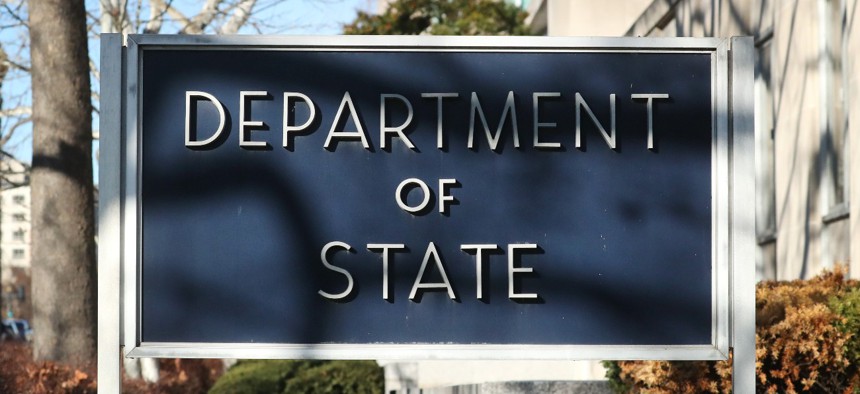
Mark Wilson/Getty Images News
How Can Federal Anti-Trafficking Efforts Advance Racial Equity?
A group of federal agencies want to know in order to further President Biden’s priorities.
The State Department is seeking information on how it can advance racial equity in its anti- trafficking efforts, which will advance President Biden’s priorities.
The State Department, on behalf of the Senior Policy Operating Group –– which is comprised of senior officials from the 20 federal departments and agencies on the President’s Interagency Task Force to Monitor and Combat Trafficking in Persons –– is looking for feedback on how it can improve its “collective awareness of the intersection between racial equity and U.S. government anti-trafficking policies and programs and to identify areas for collaboration and improvement,” wrote Zachary Parker, director of the Office of Directives Management at the State Department, in the request for information published in the Federal Register on Tuesday.
The request says this will further Biden’s executive order on using the power of the federal government to advance racial equity and support underserved communities as well as complements his executive order on advancing diversity, equity, inclusion and accessibility in the federal workforce.
Also, “because racism often compounds with other forms of discrimination to increase individuals’ vulnerability to human trafficking, advancing racial equity may also complement agencies’ efforts to improve equity more broadly,” wrote Parker, such as in furtherance of Biden’s executive orders to establish the White House Gender Policy Council; prevent and combat based on general identity or sexaul orientation; and advance equity, justice and opportunities for Asian Americans, Native Hawaiians, and Pacific Islanders.
Questions the operating group would like feedback on by March 15 include:
- What does racial equity mean in terms of human trafficking? Are there special considerations for labor or sex trafficking?
- How have federal anti-trafficking programs, systems and policies hindered advancing racial equity? How can the executive branch address this?
- How can the agencies’ part of the operating group individually and collectively advance integrated racial equity into its anti-trafficking work domestically and internationally, such as with investigations, prosecutions, victim services, grants, procurements, supply chain, research and data collecting and public outreach?
- What are some ways to address the “compounded barriers at the intersections of systemic racism and other forms of discrimination, such as discrimination against persons with disabilities, LGBTQ+ persons, and women and girls? in anti-trafficking programs?
- How can the agencies’ part of the operating group incorporate racial equity into their community and stakeholder engagements?
The Senior Policy Operating Group has representation from the State, Defense, Justice, Treasury, Interior, Agriculture, Commerce, Labor, Health and Human Services, Transportation, Education, and Homeland Security departments, Office of Management and Budget, Office of the U.S. Trade Representative, Office of the Director of National Intelligence, National Security Council, Domestic Policy Council, U.S. Agency for International Development, FBI, and U.S. Equal Employment Opportunity Commission.
It has five standing committees (on research and data; grantmaking; public awareness and outreach; victims services and procurement and Supply Chains) in addition to several ad hoc working groups.
In December, the president signed an updated version of the National Action Plan to Combat Human Trafficking, which “integrates the administration’s core commitments to addressing the needs of underserved individuals, families, and communities – including by advancing racial and gender equity; furthering workers’ rights; preventing forced labor in global supply chains; and ensuring safe, orderly, and humane migration,” Ned Price, State Department spokesman, said in a statement.
Then, on Jan. 25, Secretary of State Antony Blinken convened the Biden administration’s first meeting of the President’s Interagency Task Force to Monitor and Combat Trafficking in Persons, which is a Cabinet-level entity. In a statement afterwards, he said in the next year of the continued priorities of the State Department will be “better integrating equity-based approaches in our work, including incorporating findings from the Human Trafficking Expert Consultant Network’s project about the intersection of institutional racism with human trafficking.”







